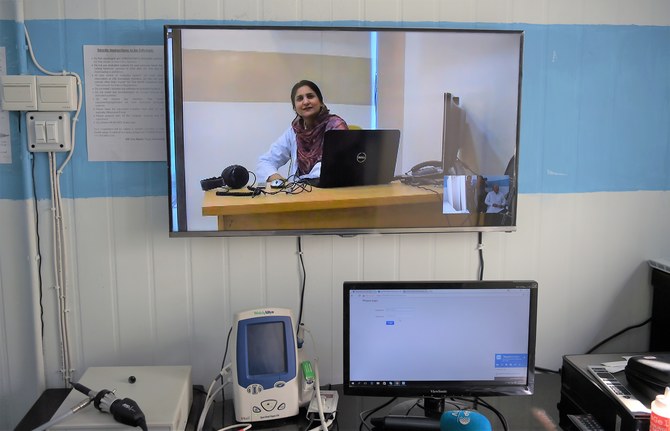KARACHI: Powered by all women doctors, a Saudi-Pakistan online medical project is remotely monitoring the home isolation of 20,000 coronavirus patients in southern Sindh province, chief of the online platform that recruits the doctors, told Arab News.
Educast is a joint Saudi-Pakistani online training and education platform which runs Pakistan’s eDoctor project.
The eDoctor initiative was first launched in the country in 2019 to bring back to the health care industry large numbers of Pakistani women doctors who had stopped practicing medicine for a number of reasons-- top among them having to relocate abroad once married, or having to quit medicine due to family pressures.
“Our trained and experienced eDoctors are now providing online counselling to more than 20,000 COVID-19 patients in Sindh province,” Abdullah Butt, founder and CEO of Educast, told Arab News.
Currently the telehealth platform attached to the Sindh government’s central corona monitoring cell comprises 450 women eDoctors from Pakistan-- living inside and outside the country-- who oversee the status of thousands of COVID-19 patients online.
The eDoctors say they are sharing the burden of frontline health workers, despite some of them being away from their home country.
“It is a unique experience of patient management… it is rewarding and challenging as well,” Riyadh-based Dr. Ambreen told Arab News.
The eDoctors provide online counselling to patients who are isolating at home after testing positive for COVID-19, and are able to prescribe medication when needed.
“We follow WHO and Sindh government’s protocols while dealing with COVID-19 patients who are home quarantined. The regular monitoring of patients makes it possible to instantly move them to the hospital in case of emergencies,” said Dr. Fatima Sabica, an eDoctor who practices remotely from Sharjah, UAE.
In December 2019, Educast’s eDoctor program won part of a $500 million grant from the Islamic Development Bank’s ‘Transform Fund,’ in the category of health care innovation, beating 5,000 other entries from 57 countries around the world. These funds are being used to set up a tele-health advisory for maternal and infant health care in Pakistan.
“The IsDB has promised a one-year grant to train in-house doctors to increase their current number from 800 to 2,000, as well as to improve the network for maternal and infant mortality reduction,” Butt said.
A call center will also be set up and a mobile application developed to facilitate doctors and patients.
Educast, under the patronage of Prince Miteb Bin Thunayan bin Muhammad Al Saud and Prince Abdul Aziz bin Miteb Al Saud, is now seeking to increase the scope of the eDoctor program in different countries around the world and the IsDB’s Transform Fund team has signalled agreement to extend funding for a COVID-19 online health advisory in Pakistan.
“The IsDB team assured their support for COVID-19 home isolation monitoring telehealth project with the government of Sindh,” Butt said.
“With the support of IsDB, it [eDoctor project] will be further expanded beyond Pakistan’s frontiers.”















